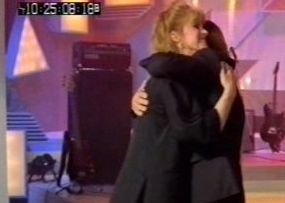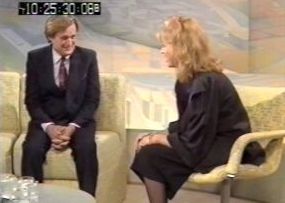 J:
Finally tonight, meet a dear friend of mine. He made an instant impact on audiences
when he played Ilya Kuryakin in The Man From Uncle. In the sixties. He went
on to star in The Invisible Man, The Great Escape, Colditz, and was, of course,
one of the stars of Sapphire & Steel.
J:
Finally tonight, meet a dear friend of mine. He made an instant impact on audiences
when he played Ilya Kuryakin in The Man From Uncle. In the sixties. He went
on to star in The Invisible Man, The Great Escape, Colditz, and was, of course,
one of the stars of Sapphire & Steel. J: He is David McCallum.
[applause, David mutters something as they embrace, which sounds like a good-natured "here we go"]
D: Your life story in one quick…
J: I know
D: … encapsulation.
J: I know.
D: And three of the greatest heavyweights ever and I come out here to talk about Mother Love. Ha ha.
J: I know, isn't it funny. Isn't it incredible. We're all feeling slightly shell-shocked at all that.
D: Well, yes.
J: Listen, McCallum, some of Sapphire & Steel was quite muddling, wasn't it?
D: I … well my mother had a … a … woman who used to come and clean named Mrs. Puttock. Do you remember Mrs. Puttock?
J: Yes, ha ha.
D: And, er, she saw the first episodes and said 'I loved it, but I didn't really understand it', so from then on in we always use to try to make the scripts Puttock proof. [audience laughter]
J: Puttock proof that, I remember. My mother had a friend in the village who said 'I love it, but it's very muddling and I watch every Thursday.' And Mummy said 'but it's on Tuesdays as well.' [audience laughter]
D: No.
J: It was good stuff though, wasn't it, I wonder if they've still got it in the archives.
D: Yes, I believe it can be seen. I never saw them, because as soon as they were done I left.
J: Yes.
D: I went back home.
J: There's a terrific - um - craze for nostalgia at the moment, have you noticed this? How the old, all the rock of ages, all these bands going out on tour, they're getting back all these shows again.
D: Well again, the sixties in New York, we these stations that play nothing but the sixties, which is just -
J: Do you?
D: - fantastic. Yes, all the music from the sixties. But when you do something like The Man From Uncle you know, you become nostalgia after about fifteen years.
J: You are nostalgia.
D: But now after twenty-five years, it's really -
J: Yes, but we have Man From Uncle coming back again now.
D: Yes, so I believe.
J: It's all huge. All sorts of things are coming back. The Avengers are coming back again.
D: Yes.
J: What is it, do you think? That's this obsession -
D: Oh God.
J: - with looking backwards?
D: I don't know. I mean, if you knew that you could go and bring something back and become a millionaire. I've no idea why it is.
J: David, what those shows… didn't they have humour in them? Wasn't there something that people that people actually like better than the shows now?

D: Well you go back to Hollywood now and you do things like Murder, She Wrote, which is the exception in the way to prove the rule. And you do various other, uh, episodic television, and the care and the time… and the whole, wonderful camaraderie, almost like a theatrical company. You know, you used to work in rep for weeks and weeks and weeks, and you all had that wonderful closeness, that wonderful working together, and everybody strove to do the best that they could.
J: Mmmm.
D: And in the days when we did Man From Uncle, and Dr. Kildare, and all of those programmes that were on MGM when I was there. You still did that.
J:: Mmmm.
D: Nowadays the decisions are all made by a lot of young executives in the Gulf and Western building in New York. And the scripts come down and it's… it's more like working in a factory. And I think that's the difference. It's money. I mean, things cost so much more.
J: So the human touch has gone a bit, hasn't it?
D: I think he human touch is not as… close or as caring… I think caring is probably the word.
J: Now look, you know people are always saying 'David McCallum, well he looks old enough to be your son', yes I'm afraid they say things like that. Is this because you're very fit, and is it to do with your diet, and what do you eat?
D: I don't think it's to do with anything except just luck. I -
J: That's great, thanks for that answer, David. [audience laughter]
D: I think my mother probably had some (laughs) You know, what do I eat? I mean eat a lot of vegetables and bread and stuff, and I've stopped drinking which has made a difference and I don't smoke…
J: Do you exercise? You do, in Sapphire & Steel you used to go five miles a day before you came in to rehearsals.
D: Yeah, I can't quite do that anymore. Um, yes I do, I found a new studio in New York called Pilatis. And he was a gentleman years and years ago who had very bad back trouble. And he developed a system of exercises, all of which are done on your back.
J: Yes.
D: And I do that now and I find that it gives you incredibly strong abdominal muscles, and I think that helps the back.
J: Now, is it right to say that one of your first loves was music?
D: Well…
J: You were a music fan, weren't you?
D: … my father was Sir Thomas Beecham's concert and leader.
J: Yes.
D: Concert Master in America. And I used to go to rehersals and spent a lot of time doing that. My mother was a cellist, so I tried to play the cello, tried to play the violin… and finally ended up playing the oboe -
J: Of course.
D: - and then I gave up oboe playing to become an actor, much to my oboe teacher's disappointment. So yes, there is a great deal of music in my background.
J: And this brings me into a nice BBC link, into the next thing, which is Mother Love. In which you play a conductor.
D: Yes, I read the script, a wonderful script by Andrew Davies. Four hours on the BBC, with Diana Rigg, who plays a very obsessive woman, and we have a son and then we get divorced. And… from then on in, the sons lies, he says he never sees his father and therein lies the whole tale. Quite terrifying, I've seen two hours of it and it is the most frightening thing I've ever seen…
J: Look, we've…
D: And I get to play a conductor.
J: And you get to play a conductor. I think we're actually we're lucky enough to have a clip -
D: Oh.
J: - of McCallum with the baton…
[48 second clip of Mother Love, followed by applause]
J: Were you… were you actually conducting?
D: I was actually conducting, yes. I - I - I'd… I've always… it's been my child's, you know…
J: Dream.
D: …dream to do that.
J: Was it nerve-racking, or exhilarating?
D: I - I was very prepared, I worked for a couple of weeks, I learned the Prokofiev and the Mozart that we conduct later.
J: Yes.
D: And I'd watched so many conductors in my life, and I know there's so much showmanship. And my father told me many things, like when they had bad conductors the orchestra goes on automatic pilot and things like that.
J: Yes.
D: And I didn't want that to happen with me, and so I actually did conduct, but it… I … my first down beat probably had sixty beats in it because I was so nervous. [Joanna laughs] And it was, it was… Prokoviev, you know, going in conducting Prokoviev, the first time you've ever stood up front of an orchestra is really quite difficult. And it was like pulling an alligator by the tail at the… start because they didn't, they thought 'who's this actor, who's come along?' But once we got together and things started to move and we began to actually make takes, then it got just glorious, just glorious.
J: It's heady stuff, isn't it?
D: I am ready to conduct any symphony orchestra worldwide. [laughs]
J: Ah thrilling. Now, David, you are - you seem to be to many people the most quintessentially English kind of person. I mean, by that, I just mean, you know, you just look English… ish. And yet you've made America your home for a long time. What's the attraction of America?
D: Well the original thing was… was socialism. I mean, it was at the time when this country became very socialist. And I've… I've never made any you know, pretence about the fact htat I'm ratehr right-wing in my feelings about… I mean, I like to work, a work ethic, you know, and so when this country went socialist I went to America, and it proved to be everything I've always… liked about living and life and people.
J: The land of opportunity?
D: The land of opportunity, land of hard work, the land of … I don't know, it's a whole different way of life and it happens to suit the way I…I live. And I'm married to an American and I have two American children and it just has become…
J: And you have a voice which in England sounds slightly… slightly American, but I guess in America you've got a very English voice.
D: It's the other way around.
J: Oh is it?
D: It's a problem, they say 'Oh, you're so British.'
J: Oh, do they? [pause] Oh, do they?
D: But I adore coming back here and it's wonderful to come and work. See family and friends.
J: Will you come over and do theatre here do you think?
D: I would love to come and do theatre here. Well I did, I did Ray Cooney's Run For Your Wife for quite some time.
J: Course you did. Course you did. Will you come back?
D: Oh, I'd love to.
J: We might do something, mightn't we?
D: Yes. Ha ha.
J: Wouldn't it be fun?
D: Sapphire & Steel on ice. [audience laughter]
J: Oh, wouldn't it be great? Ladies and gentlemen, David McCallum. [applause]